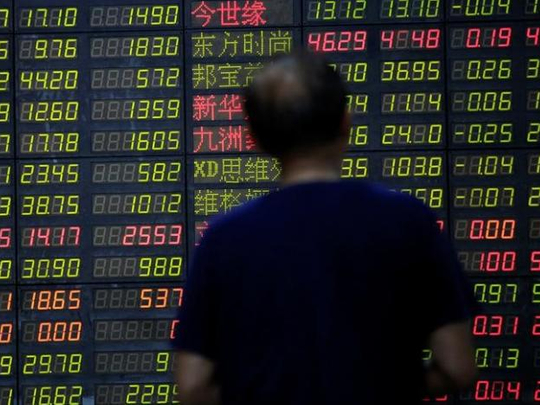
LONDON: World shares set up camp at one-year peaks on Monday as a rally in Chinese stocks helped offset news that Japan's economic growth had ground to a halt in the last quarter, while oil prices extended their latest rally.
Wall Street looked set to add fractionally to last week's string of all-time highs while London, Frankfurt and Paris were up 0.2-0.4 percent as healthcare and energy stocks kept them buoyant in Europe.
China stood out in Asia as the blue-chip CSI300 Index
jumped 3.3 percent to a seven-month high amid speculation more stimulus would be forthcoming from Beijing after a raft of weaker-than-expected July data.
"The big complacency is back again in some sense. It is all a bit easy," said SEB investment management head of global asset allocation Hans Peterson.
"Luckily we went quite long of risk after Brexit and now we have taken a bit off ... Technically one should note that volatility is extremely low and that is usually a reason to be on your toes." The need for further policy action in Japan was underlined by its subdued second-quarter economic reading, leaving the Nikkei down 0.3 percent.
MSCI's broadest index of Asia-Pacific shares outside Japan
recouped early losses to edge up 0.2 percent.
It has climbed 14 percent since June when Britain's vote to leave the European Union unleashed a new wave of global policy stimulus, led by aggressive action from the Bank of England.
All this easing has pushed rich-world bond yields dramatically lower and driven investors to seek higher returns in longer-term debt and in emerging markets.
Yields on British 10-year gilts have more than halved to all-time lows of 53 basis points (bps), having been up at 1.39 percent just before the Brexit vote.
That has pulled down rates right across Europe. German Bunds were at a deeply sub zero -0.16 percent ahead of U.S. trading and Spanish yields were comfortably under 1 percent at 0.92 percent having falling over 60 bps in the last couple of months.
The plunge in returns on bonds has made equities look more attractive in comparison. The Dow, S&P 500 and Nasdaq all made record closing highs last week for the first time since 1999. Emerging market stocks have surged by almost a third since mid January.
"The broader earnings trend has shown some further improvement in Asia but we believe it is really a surge in foreign buying that has pushed markets higher," say analysts at Nomura in a note.
"While a continued switch in flows from developed markets to emerging is something we expect on a medium-term basis, the recent pace has been very rapid and sentiment levels are elevated. In the near-term we now recommend positioning for a pause." For Reuters new Live Markets blog on European and UK stock markets see
Parsing on the Fed
High on the U.S. calendar this week are inflation figures for July and minutes of the last Federal Reserve meeting which might offer more clues on the chance of an interest rate hike by year end. There are also five separate Fed speakers on the docket this week.
U.S. retail sales growth was unexpectedly flat in July as consumers cut back on buying clothes and other goods, while the producer price index fell 0.4 percent in July, the biggest drop in nearly a year.
The European Central Bank releases minutes of its last meeting on Thursday, and should strike a dovish tone.
Investors have recently lengthened the odds on any Fed hike this year, with futures {0#FF:} implying around a 46 percent chance of a move in December.
That in turn has weakened the bullish case for the U.S.
dollar and dragged it down against the euro, yen and a range of emerging market currencies.
The dollar was last at 100.99 yen and not far from important support around 100.80. The euro was nudging higher at $1.1171 having held in a $1.1050 to $1.1230 range for the last couple of weeks.
One outlier has been sterling, which has slipped steadily since the BoE's easing. It stood at $1.2897 and ever closer to the post-Brexit trough at $1.2797.
In commodity markets, oil prices crawled higher after boasting gains of 6 percent last week as Saudi Arabia's oil minister held out the chance of action to help stabilize the market.
Brent crude futures gained as much as 35 cents on Monday to $47.67 a barrel before losing traction, while U.S.
crude eased back after touching $45.15. Coal/shas also been on a roll but so too has safe-haven gold.
It was up 0.4 percent at $1,340 an ounce and is now up 25 percent since the start of the year.
"In general the negative rate environment, particularly in the euro zone and Japan, is going to keep gold well bid," Mitsubishi Corp strategist Jonathan Butler said. Traders' focus remained heavily on possible U.S. interest rates moves, he said.












